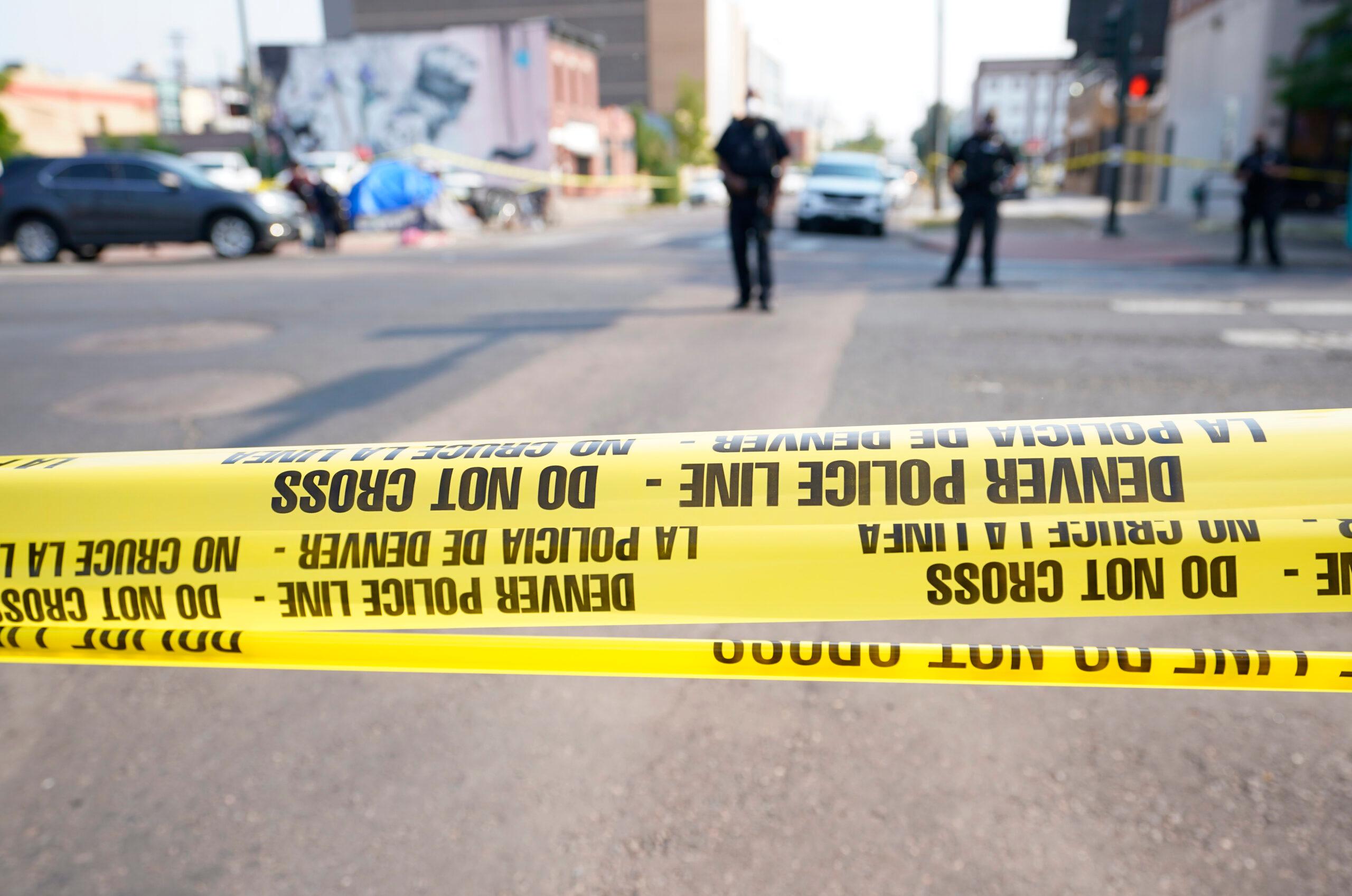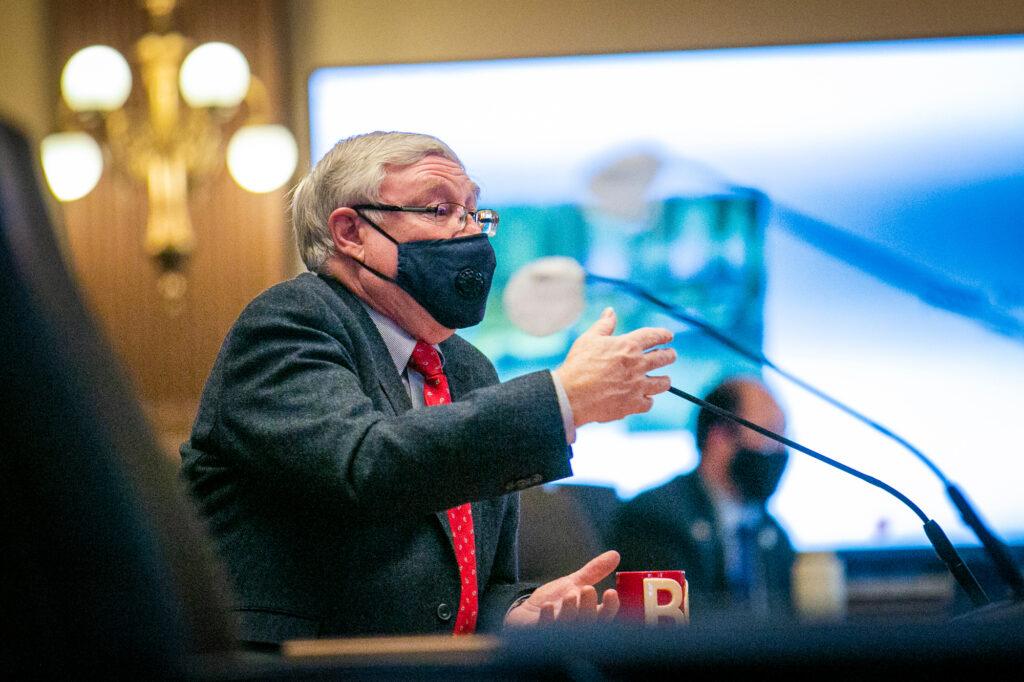
Amid a flurry of police brutality protests in the wake of George Floyd’s murder, criminal justice reform advocates at the Colorado legislature seized the moment last summer and passed one of the most sweeping police reform laws in the country.
Advocates and lawmakers hoped to nudge those efforts forward this year — introducing a series of criminal justice bills that could further overhaul how police officers do their jobs, liberalize laws on when people have to go to jail and make it easier to let people out of prison.
But compared to the wide support for last year’s bill, these new proposals have run into significantly more opposition — thanks in part to rising crime rates and differing partisan views on how to balance public safety and justice reform.
Democratic state Rep. Leslie Herod, who helped author the 2020 police reform law and is behind a bill this year to strengthen it, believes the country is at a different point now.
“We are at a place where there is tremendous backlash against the movement for racial equality and the movement for Black lives,” she said.
Opponents to the current crop of proposals object to that description, and say their concerns are with policies they believe would reduce public safety.
“Everybody is interested in making the criminal justice system better, the goal of any reform is to make something better,” said Tom Raynes, head of the Colorado District Attorney’s Council. “Not to attack the system and just pull pieces out because you don’t like them.”
And so the debate over this year’s slate of bills is a more familiar one, with law enforcement groups and Republicans generally on one side and civil rights organizations and progressive lawmakers on the other. But with Democrats in control of both chambers, how far the legislature goes on these issues is likely to rest in the hands of the party’s more moderate members.

Rising crime reshapes the debate
Colorado saw an escalating crime rate in 2020 — with increases in virtually every category. The numbers were notably high for auto theft, property crime and violent crime, according to the Colorado Bureau of Investigation.
Statewide, violent crime rose 6.5 percent over the 2019 numbers and auto thefts were up by almost 40 percent from the year before.
In Denver last year, the number of homicides was more than 50 percent higher than in 2019.
Advocates pushing for reform legislation say law enforcement is using those numbers to unfairly attack their proposals — they argue most of the bills focus on changing how the system responds to low-level crimes, not violent ones.
“I think more and more people do understand that incarceration is not actually serving public safety,” said Rebecca Wallace, an attorney with the American Civil Liberties Union, which is behind several of the criminal justice reform bills pending in the state legislature. “When you prosecute and lock people up for the kinds of offenses that we’re talking about … you’re more likely to see serious crime.”
But law enforcement and prosecutors worry this focus on overhauling the role of police and jails will ultimately make Coloradans less safe.
“The primary goals should be victim-based, crime reduction-based, accountability-based, and balancing that with the safety and concerns of the community,” Raynes said. “It all has to be balanced, but fundamentally the criminal justice system is about getting the bad guys off the street.”

‘Completely different rules of the game’
When the police accountability bill passed last year, it received only 13 no votes in the state House, and one in the Senate. Law enforcement groups requested changes to the bill but didn’t mount any major opposition.
This year, Herod wants to build on that law with one that would make it easier for people to sue State Patrol troopers; mandate the use of de-escalation techniques prior to resorting to physical force; and require more investigation of use-of-force incidents.
“We have a system that is not working, that is completely broken and we need to fix it,” Herod said. “And we need state law to do that. We also need federal law and we need local municipalities to step up and change their policies as well.”
But law enforcement officers say these changes are coming far too soon; they are still learning how last year’s law works — and some of it hasn’t even taken effect yet.
“If this passes, you could have completely different rules of the game three times in just a matter of a year and that certainly concerns us,” Larimer County Sheriff Justin Smith said. “We all have a desire and need to know the rules and know how things work … it’s creating concerns.”
Republicans at the state Capitol worry that the police accountability proposals don’t provide enough clarity for officers, especially use of force standards in situations where law enforcement must make quick decisions.
Under last year’s law, police are only supposed to use deadly force if there is a substantial risk that the suspect is an imminent danger to the officer or others.
This year’s bill clarifies that “imminent does not mean the mere fear of future harm, no matter how great the fear and no matter how great the likelihood of the threat.”
Herod introduced her bill in late March. It passed its first committee on a party-line vote but it has yet to receive a full vote in either chamber.
Republican state Sen. Bob Gardner sits on the Senate Judiciary Committee and worked closely with Herod on last year’s bill. Still, he felt it was rushed in the midst of police brutality protests. He negotiated for certain changes, like limiting when police must release body camera videos in response to concerns about privacy violations for civilians and victims of certain crimes.
“I don't regret voting yes” Gardner said. “We had to do what was right and appropriate at the time. But at the same time, I and others said, we're going to be back revisiting this because there are things in this bill that needed to be tightened up, written better, drafted better. For a major, major piece of legislation, the bill happened so quickly, there were bound to be issues.”
Gardner objects to the direction of the criminal justice bills Democrats have introduced this year. But he said with extensive changes, all of the law enforcement accountability bills this session could get to a form where he would support them,
“Law enforcement itself really wants and expects accountability (and) confidence from the public as well,” Gardner said. “The stakes are too high not to.”

Lawmakers debate who should go to jail, and when and why
One of the most divisive criminal justice bills lawmakers are debating this year would restrict when police officers are required to take a person to jail versus just issuing them a ticket for a later court date.
The effect would be to liberalize how officers treat thousands of people accused of lower-level crimes every year.
Criminal justice reform advocates say they pushed to introduce the Jail Population Management bill, or SB21-062, in response to Colorado’s growing jail population. The majority of people incarcerated in county facilities have not been convicted of anything, but may not be able to fork over enough money for a cash bond.
If passed, law enforcement officers would issue summons, rather than taking someone to jail, for misdemeanors and some low-level felonies, including drug crimes and theft. Officers would still have discretion to take someone into custody if they think that suspect poses a safety risk or there is a threat of re-offense.
Law enforcement groups worry that the proposal amounts to slaps on the wrists for people who carry out crimes that actually hurt people.
“Crime victimization has a disproportionate impact on disadvantaged populations, including our most vulnerable and poor,” said Boulder Police Chief Maris Herold, testifying against the measure to the Senate Judiciary Committee. “A motor vehicle theft from someone with status is a nuisance. A motor vehicle theft from a single mother is devastating.”
Democratic state Sen. Pete Lee, who chairs the Senate Judiciary Committee, is the main sponsor of the measure. He said the overall goal is to de-escalate situations whenever possible.
Lee cites the recent case in which the Loveland police forcefully arrested Karen Garner, a 73-year-old woman with dementia, on suspicion of shoplifting as a good reason this proposal should become law.
Garner’s case has drawn strong condemnation and is now under investigation. Lee said it highlights the need for police departments to train officers differently. While his bill doesn’t specifically deal with training, he hopes it will ultimately lead to changes in how officers handle minor calls.
“I think the police need to change their outlook on confrontations with citizens over minor offenses and not immediately think that they need to take someone into custody, arrest them and take them to jail when a ticket will do the job.”
Connie Brenton, owner of the Art Mart on the Pearl Street Mall in Boulder, recently testified against Lee’s bill, telling lawmakers how her business has been repeatedly targeted by shoplifters — often the same people. She worries that if this bill passes, it would make the situation even worse.

“With no meaningful consequences or deterrents, they feel emboldened to do what they want,” Brenton told the Senate Judiciary Committee. “They now steal right smack in front of us. They look us in the eye, pick up the item and walk out of the store. The situations are so frequent now that we know these perpetrators by name and they’re becoming increasingly violent.”
In the face of significant opposition to the bill, lawmakers recently amended it to allow officers to arrest people suspected of auto theft and class 4 felonies, which include assault.
That change helped ease the concerns of Democratic state Sen. Jeff Bridges, who now plans to vote yes.
“I think it was too broad,” Bridges said of the original proposal. “And I just could not in good conscience prevent the police from arresting someone who stole a car or broke into a home.”
But the amendments haven't eased law enforcement concerns.
Larimer County Sheriff Smith said the policy would still be pretty confusing for an officer working patrol at 3 a.m. as they tried to remember which crimes they could arrest for, and which are only tickets.
“You may be able to walk through this with some attorneys in a legal process,” Smith said, but, “for an average police officer or deputy sheriff, that’s extremely hard in the field to navigate.”
Raynes with the District Attorneys Council said prosecutors wish there was more conversation and collaboration between criminal justice reformers and law enforcement about the dangers inherent in their jobs in today’s climate.
“It’s been noticeably different in many bills this year,” Raynes said. “When you’re talking about (something) as serious as criminal justice reform, the goal of any reform should be to make something better … and to listen.”
Smith and other law enforcement leaders say they’re concerned overall that the push to liberalize certain laws in Colorado will only make the crime rate worse — and people less safe.
“I always think it’s important to put faces to these victims. I don’t want to think of victims as numbers, because they’re not,” said Boulder Chief Herold in her testimony. “The one thing I’m really concerned about is repeat victimization, community harm … and lastly, when the community doesn’t feel like the government is providing protection. I’m seeing an explosion that people want to arm themselves.”

These are the other criminal justice reform bills under consideration:
While Herod and Lee's bills are attracting much of the attention at the capitol, there are numerous other criminal justice reform measures in various stages of the process this year.
- Restrictions on the administration of ketamine in a law enforcement situation: EMT companies can get a state waiver that allows them to administer the powerful sedative ketamine in emergency situations outside of a hospital. But the 2019 death of Elijah McClain, after being given a dose large enough for someone twice his weight, has brought scrutiny to what happens when paramedics use the drug on people who are being arrested. This bill, which was significantly overhauled at its first hearing, puts new guardrails on when EMTs can administer the drug and what safety measures must be in place.
- Changing the penalty for felony murder: A Democratic bill signed by Gov. Jared Polis reduces the penalty for felony murder from life without parole to a range of 16 to 48 years. Felony murder charges can be brought against any participant in an eggregious crime — like burglury, arson, kidnapping or some sexual assaults — where the victim dies, even if the person being prosecuted didn’t cause the death. Proponents of reducing the penalty argued it resulted in people spending their lives in prison for relatively minor roles in crimes gone bad.
- Bond Setting Within 48 Hours of Arrest: This requires a bond hearing to be held within 48 hours of arrest — even if the arrest happens on a weekend or a holiday. The bill would also require a person in custody to be released six hours after a bond is set. Advocates point out that people often languish in jails pre-trial for several days before they see a judge — particularly in rural areas or on holiday weekends. The bill allows courts to use video court for first appearances. Rural areas just want the funding to set up the proper equipment to make this happen on weekends and holidays especially. The bill has a $1.7 million fiscal note over several years.
- Revised policies for eyewitness identification: HB-1142 requires police departments to follow state-mandated best practices when they bring a suspect in for a crime victim to identify. Backers say research has shown eyewitness ID’s can be unreliable, especially when the victim and the suspect are of different races. The bill was sponsored by Democrats but has received bipartisan support as it’s moved through the process.









